From causes to consequences: A changing geographical perspective in Africa
Water in Africa is a highly politicised and researched topic. With the increasing environmental change that is occurring due to the negative externalities associated with climate change, issues related to water are only going to increase in the coming years. The political agenda globally on climate change has focused in the past on the causes of this climate and environmental change. In this paper, Oestigaard highlights that we should now change this geographical discourse to emphasising the consequences of environmental change in the context of water in Africa (Oestigaard, 2011) However, Oestigaard is keen to point out that emphasising the consequences does not mean to the detriment of researching and utilising current environmental change mitigation policies in relation to the known causes of climate change, but rather increasing the focus on the consequences in Africa and how the development of the many nations can fit into that new contextual perspective. Thus, this blog post is going to investigate the need to shift our environmental water change discourse to focus more heavily now on the consequences of climate change and the public policies that can and should be implemented to adapt to the water issues that are arising.
The current political agenda of water and environmental change focuses primarily on the causes of the negative externalities and the ways that we can implement mitigation strategies at a global homogeneous scale to help at-least reduce the serious effects of the anthropocentric warming that we are recording. This current political geographic perspective has a linear outlook on which countries should act mitigate carbon emissions, regardless of their historic and current contribution of emissions. For example, African countries currently only emit 4% of global greenhouse gas emissions; whilst the global political forum still highlights the need for African countries to commit to greenhouse emissions reductions (e.g Paris Accord; which came into effectiveness in November of 2016). This highlights that the political agenda is focused on mitigation of the causes of climate change and the associated environmental change at the global scale, neglecting that many emerging nations have contributed significantly less to this environmental crisis. For example consequences such as the "Day Zero" in South Africa and the extreme drought currently being experienced in Somalia and Ethiopia were arguably caused by the rapid historic industrialisation of America, much of Europe and elsewhere, starting the anthropocentric forcing that has led to the environmental change see through a warming planet, changing hydrological patterns and increased extreme weather events. Therefore, this perspective of linear environmental perspective needs to shift to accommodate this neo-geographical mindset on water and instead implement public policies that attempt to adapt to the consequences of environmental change on location contexts. This would allow Africa to meet the consequences in a way that was specific to their environmental situation.
Hence, as Oestigaard argues as his key point, if we shift this geographical perspective from the highly politicised causes of climate change, then we can better implement aid strategies and local public policies that allow individual locations to adapt in a context that is more greatly applicable and positive to them. The IPCC Fourth Assessment Report highlights that "adaptation and mitigation can be complementary [and] substitutable..." (IPCC, 2007). This assessment by the IPCC shows that adaptation can work alongside mitigation, thus our geographical perspective should more readily incorporate adaptation. Due to African countries contributing to only 4% of global emissions, they should not bear the significant burden of mitigating climate change, as they only had a very minor role to play in the anthropocentric causation. Thus, adaptation to the consequences of this environmental change which is negatively effecting water should be at the top of the public policy agenda. Adaptation strategies could include the construction of larger and more advanced reservoirs (e.g. Sterkfontein Dam in South Africa), improved agricultural irrigation practises (drip irrigation in Burkina Faso (Wanvoeke, 2016)) and improved small scale local ground pumps that allow increased access at the local level (Massuel, 2018).
However, changing to this new geographical perspective will take time and collective effort in the social, political and academic paradigm.
However, changing to this new geographical perspective will take time and collective effort in the social, political and academic paradigm.
Next weeks blog will look at how this changing geographical perspective can benefit specific case studies in many African countries at the national and local scale.



Comments
Post a Comment